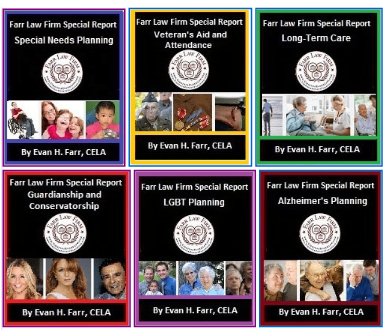Please Don't Leave that to Me!
Published: Fri, 09/04/15
 |
Please Don't Leave that to Me!If you cannot view the image below, please read the article on our blog. Q. My aunt Bettina (Betty) has over 6,000 Barbie dolls, worth more than $150,000, that she mentioned she may leave to me when she does her estate planning. Although they are valuable, I am secretly hoping she doesn't, because she wants them displayed in their own room, and asks that they never be
sold. The challenge for me is that I have three young sons, a dog that eats plastic, and a small home. Where would I put such a collection? For that reason and because I love her dearly, if she does leave them to me, I hope she stays around for a long time!
Speaking of collections, my husband collects firearms (mostly historical ones). We also have a vacation home in Virginia Beach, and tons of airline miles from my husband's job. How would people like Aunt Betty and my husband leave such items to
someone, stipulating exactly what they want done with them (especially the guns with all of the legalities involved)?
A. Certain items, such as firearms, pets, airline miles, and vacation homes, cannot simply be left to others in the same way that you would leave other property. They may be subject to strict regulations, or you (or your husband or Aunt Betty) may have specific instructions that may not be accounted for in your Wills or Trusts. Luckily, there are trusts and other strategies available
for these things, as I will explain below.
Firearms
Passing firearms in an estate is much different than passing on other personal property. The National Firearms Act (NFA) very strictly regulates the possession and transfer of firearms. In addition, states and even local jurisdictions have an array of firearms transfer rules that must be followed:
There are potentially serious unintended consequences to transferring firearms to a revocable trust, including the additional liability the successor trustee takes on when attempting to follow the required legal procedures for seeking ATF approval for distributing the gun to the trust beneficiaries. Therefore, a wise choice for transferring firearms is to use a Revocable Living Trust (RLT) designed specifically
for the transfer, ownership, and possession of guns. Many estate planning attorneys call these “NFA” trusts or “Gun Trusts.” Using a “Gun Trust” can avoid or minimize many of the challenges of passing on firearms.
Keep in mind that it is important to obtain competent legal representation in order to avoid unforeseen hazards. Therefore, it is essential that you meet with an estate planning attorney experienced in these matters, such as myself, to set up a “Gun Trust.” As the founder and original chair (for 5 years) of the Shooting Sports Committee for the Boy Scouts of America National Capital Area
Council, I have extensive experience with all things gun related. You can read more about Gun Trusts here.
Vacation Homes
Vacation homes are special places to many families. Parents often work hard to buy a vacation place and cherish the idea of keeping the property in the family, so their children and their children's children can share lazy summer days or cozy fireside gatherings.
Before leaving an interest in your vacation home to a family member, confirm that the family member really wants it. Talk to your loved ones first to learn their preferences, then be sure to put the real estate in a trust and make your kids the beneficiaries. If you don't put your out-of-state real estate in a trust, but rather let it pass through a Will, that real estate is going to have to go through
probate in the state where it is located, causing a double nightmare for whoever you name as the executor of your Will. The trust structure lets you spell out under what conditions the house can be sold, how a sharing schedule will be decided, and who pays for upkeep. If possible, you can reduce conflict by leaving extra money to cover costs.
Airline Miles
Frequent-flier miles can be worth a lot, but you may not be able to pass on the wealth. Some carriers explicitly say you cannot bequeath miles. And policies change. In fact, Delta disallowed mileage bequests in 2013.
First, ask your airline. If you find out your miles cannot be left to someone else, you may be better off spending down miles now or buying trips for other people if you’re traveling less. Keep in mind, though, that even carriers that officially bar fliers from bequeathing miles—like American Airlines—often allow it on a case-by-case basis, so do always name a beneficiary in your Will.
Beneficiaries may need to request and complete an affidavit and provide the death certificate.
Something else to keep in mind: be sure a beneficiary knows the online log-in information of the deceased member to access the miles. It would be a shame to forgo the points a loved one has taken many pricey trips to earn.
Planning for Unique Assets
Firearms, vacation homes, and airline miles are unique assets that require an estate plan to be uniquely tailored to plan for them. If you already have an estate plan and long-term care plan, call us to review and update your plan accordingly. Be sure to ask about The Farr Law
Firm’s Lifetime Protection Program, which ensures that your documents are properly reviewed and updated as needed, so that they will have maximum effect at law. If you don’t have an estate plan or long-term care plan, now is the time to get started. Call us today to set up an appointment for a no-cost consultation:
Fairfax Estate Planning Attorney: 703-691-1888
Fredericksburg Estate Planning Attorney: 540-479-143 Rockville Estate Planning Attorney: 301-519-8041 DC Estate Planning Attorney: 202-587-2797 ---- -Demonstrated substantial involvement in special needs and elder law practice, by demonstrating a minimum number of individual cases, spread across a number of different categories making up the “elder law” definition. CAP means the Mr. Farr is a member of NAELA’s Council of Advanced Practitioners, which is an invitation-only council that was founded by NAELA for Advanced Practitioners. Members of the Council are: -recognized as innovators of the profession; -instrumental in leading the future of Elder Law; -a major source of speakers, writers, and leaders of NAELA programs; and -NAELA’s role models, providing a "vision" for NAELA and mentoring for NAELA members. Membership in CAP is available to preeminent Elder Law Attorneys. Eligible Candidates must be: a NAELA member for a minimum of 10 years, AV rated by Martindale Hubbell, and either a NAELA Fellow or a Certified Elder Law Attorney (CELA). You can read more about CAP on the NAELA website. Not everyone is qualified to give Elder Law and Medicaid advice. Mr. Farr is currently one of only 8 attorneys in the Northern Virginia / DC Metro area that holds both the CELA and CAP credentials. Before moving forward with an attorney, ask about his or her credentials and training, or look them up online at the links given above. Keep in mind that a CELA (and CAP) certification is confirmation that your lawyer is “more than just qualified” and that you are getting “the best legal representation available.” (source: The National Elder Law Foundation). Hop this is helpful, Commander Bun Bun |
|
||
|
This email was sent to
.
|










